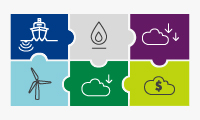About Shell
Our strategy
Shell is an international energy company with expertise in the exploration, development, production, refining and marketing of oil and natural gas, as well as in the manufacturing and marketing of chemicals. Our New Energies business pursues two main areas of opportunities: new fuels for transport, such as advanced biofuels, hydrogen, and charging for battery-electric vehicles; and power, including low-carbon sources such as wind and solar as well as natural gas.
In 2017, Shell:
- Produced 3,664 thousand barrels of oil equivalent on average per day.
- Traded more than 8 million barrels of physical crude oil on average every day.
- Sold 66 million tonnes of liquefied natural gas.
- Served 30 million customers on average every day at our retail sites.
- Made capital investments of $24 billion.
We are one of the world’s largest independent energy companies in terms of market capitalisation, cash flow from operating activities, and production levels. We explore for and produce oil and gas worldwide, both from conventional fields and from sources such as shales and deep water. We work to develop new oil and gas supplies, and have a global network of refineries and chemical plants. Shell transports and trades oil, gas and other energy-related products, such as electricity and carbon-emission rights. Our New Energies business, which we created in 2016, invests in commercial opportunities linked to the energy transition. This business focuses on new fuels, such as biofuels, hydrogen and charging for battery-electric vehicles; and power, including from low-carbon sources such as wind and solar as well as natural gas. We also invest in new business models and digital technology that improve our core business. Around 30 million customers every day are served through Shell’s global network of 44,000 Shell-branded retail stations.
Our purpose and business strategy
Shell’s purpose is to power progress together with more and cleaner energy solutions. Our strategy is to strengthen our position as a leading energy company by providing oil and gas and low-carbon energy as the world’s energy system changes. Safety and social responsibility are fundamental to our business approach. Shell will only succeed by working with customers, governments, business partners, investors and other stakeholders.
Our strategy is founded on our outlook for the energy sector and the chance to grasp the opportunities arising from the substantial changes in the world around us. The rising standard of living of a growing global population is likely to continue to drive demand for energy, including oil and gas, for years to come. At the same time, technology changes and the need to tackle climate change means there is a transition under way to a lower-carbon, multi-source energy system with increasing customer choice. We recognise that the pace and specific path forward is uncertain and so requires agile decision making.
Strategic ambitions
Against this backdrop, Shell has the following strategic ambitions:
- to provide a world-class investment case. This involves growing free cash flow and increasing returns, all built upon a strong financial framework and resilient portfolio;
- to thrive in the energy transition by responding to society’s desire for more and cleaner, convenient and competitive energy; and
- to sustain a strong societal licence to operate and contribute to society through a shared value approach to our activities.
The execution of our strategy is founded on becoming a more customer-centric and simpler company, focused on delivering higher and more predictable returns and growing free cash flow. By investing in competitive projects, driving down costs and selling non-core businesses, Shell continues to seek to reshape its portfolio into a more resilient and focused company.
Our ability to achieve our strategic ambitions depends on how we respond to competitive forces. We continuously assess the external environment – the markets as well as the underlying economic, political, social and environmental drivers that shape them – to evaluate changes in competitive forces and business models. We undertake regular reviews of the markets we operate in and analyse our traditional and non-traditional competitors’ strengths and weaknesses to understand our competitive position. We maintain business strategies and plans that focus on actions and capabilities to create and sustain competitive advantage. We maintain a risk management framework that regularly assesses our response to, and risk appetite for, identified risk factors.
Strategic themes
As part of our strategy, we divide our portfolio into strategic themes, each with distinctive capabilities, growth strategies, risk management, capital allocation and expected returns:
- Cash engines are strategic themes that are expected to provide strong and resilient returns and free cash flow, funding shareholder returns and strengthening the balance sheet. Shell continues to invest in selective growth opportunities for cash engines. Our cash engines are conventional oil and gas in Upstream, Integrated Gas, and oil products in Downstream.
- Growth priorities are the cash engines of the future. Shell seeks to invest in affordable growth in advantaged positions with a pathway to free cash flow and returns in the near future. Our growth priorities currently are deep water in Upstream and chemicals in Downstream.
- Emerging opportunities are strategic themes that are expected to become growth priorities after further development. These opportunities should provide us with material growth in free cash flow in the next decade or beyond. We seek to manage our exposure to these businesses while establishing scale. Our emerging opportunities currently are shales in Upstream and new energies, which is part of the Integrated Gas and New Energies organisation.
 Sustainability at Shell
Sustainability at Shell
 Sustainable development goals
Sustainable development goals
 About our data
About our data
 Energy transition and climate change
Energy transition and climate change